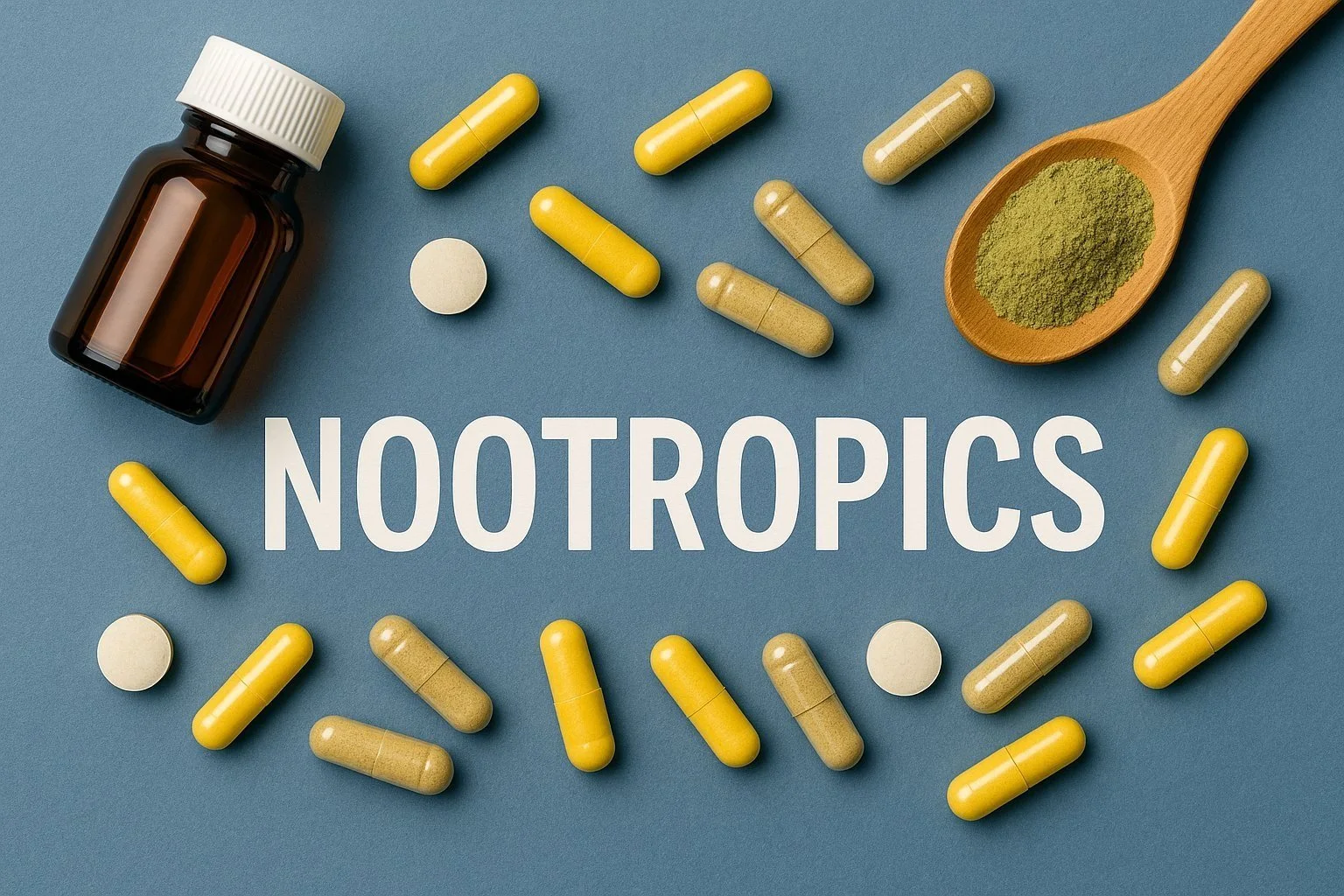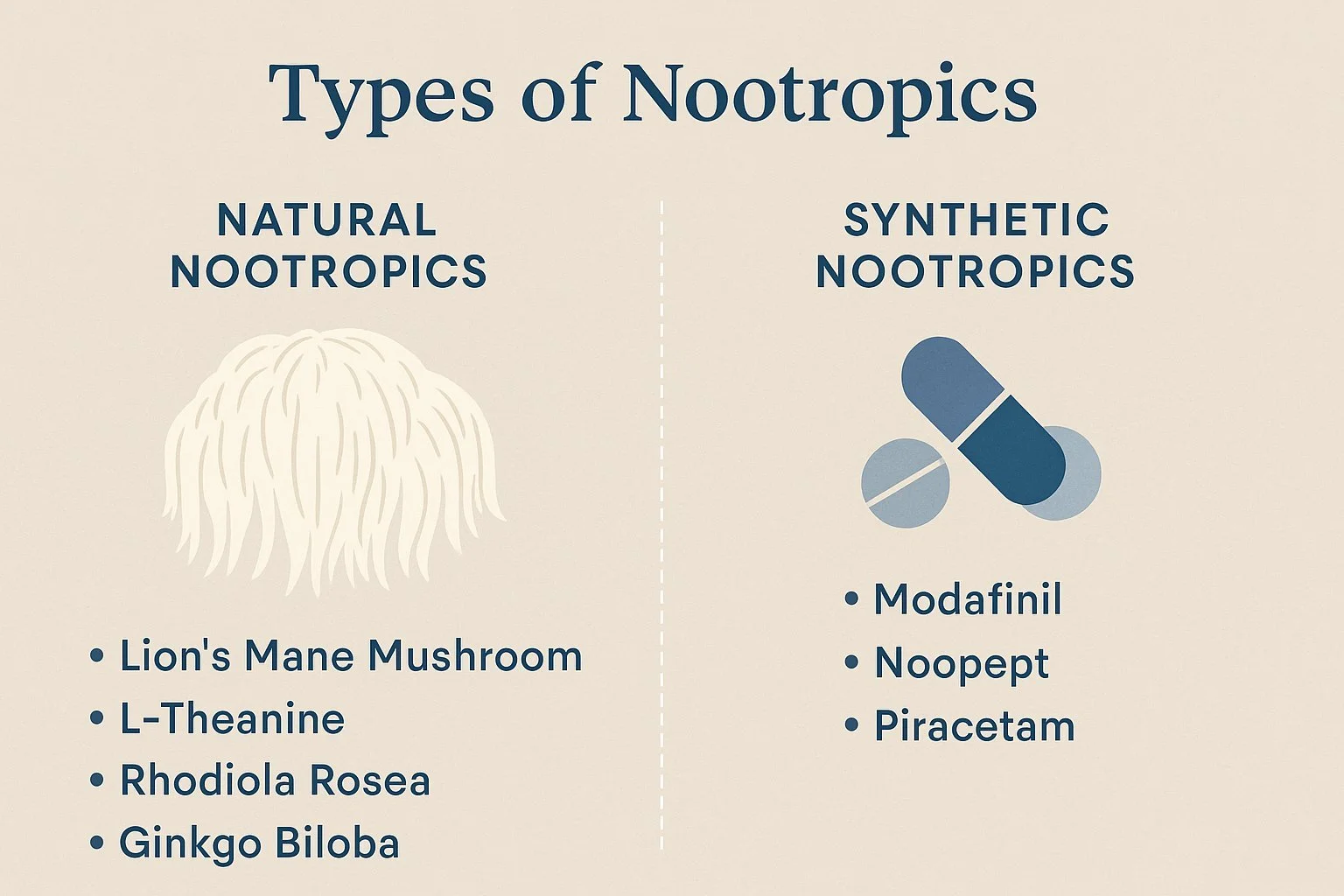What are Nootropics?
Nootropics, often called “smart drugs” or “brain boosters,” are growing in popularity among students, entrepreneurs, athletes, and anyone seeking sharper focus, better memory, or a cognitive edge. But what exactly are they—and do they actually work?
This guide breaks down the science, types, benefits, and frequently asked questions about nootropics so you can make informed decisions about your mental performance and wellness.
What Are Nootropics?
Nootropics are substances—natural or synthetic—that are claimed to enhance cognitive function, particularly memory, creativity, motivation, and attention. The term was first coined in 1972 by Romanian chemist Corneliu Giurgea, who outlined criteria that included safety, brain enhancement, and minimal side effects.
How Do Nootropics Work?
Nootropics influence the brain by:
Increasing neurotransmitter activity (e.g., dopamine, acetylcholine)
Boosting blood flow and oxygen to the brain
Reducing inflammation and oxidative stress
Supporting neurogenesis (the growth of new brain cells)
Types of Nootropics
1. Natural Nootropics
These are plant-based or derived from natural compounds:
Lion’s Mane Mushroom – supports nerve growth factor (NGF)
L-Theanine – promotes calm focus
Rhodiola Rosea – reduces fatigue and stress
Ginkgo Biloba – improves blood flow and memory
Caffeine – boosts alertness and concentration
2. Synthetic Nootropics
These are lab-formulated compounds, often used under medical supervision:
Modafinil – used to treat narcolepsy and boost wakefulness
Noopept – supports memory and learning
Piracetam – first synthesized nootropic, shown to support cognitive aging
⚠️ Synthetic nootropics may carry risks and should be used with caution.
What Are the Benefits of Nootropics?
Cognitive Enhancement
Improved focus, alertness, reaction time, and mental stamina in both short-term tasks and long-term learning.
Stress & Mood Regulation
Many nootropics (especially adaptogens) support lower cortisol levels, promote resilience, and reduce symptoms of anxiety and depression.
Neuroprotection & Aging
Some compounds have been studied for their potential to delay cognitive decline and protect against Alzheimer’s or Parkinson’s disease.
Physical Endurance & Recovery
Nootropics like Rhodiola and Cordyceps may improve physical stamina and reduce mental fatigue during intense training or stressful periods.
Frequently Asked Questions
Are nootropics safe?
Natural nootropics are generally well-tolerated.
Synthetic nootropics should be used with medical supervision.
Always check for third-party testing and avoid proprietary blends without transparency.
Do nootropics really work?
Many natural nootropics are supported by clinical trials showing cognitive or mood benefits.
Effects vary between individuals and are often subtle, cumulative, and most effective when paired with good sleep, nutrition, and exercise.
How long does it take for nootropics to work?
Some, like caffeine or L-theanine, work within hours.
Others, like Lion’s Mane or Bacopa, require daily use for 2–6 weeks for noticeable results.
Can I take nootropics every day?
Many nootropics are safe for daily or cyclical use (e.g. 5 days on, 2 days off).
It's essential to rotate or “cycle” certain compounds to avoid tolerance.
Should You Try Nootropics?
If you're looking to:
Increase mental clarity
Reduce stress and brain fog
Improve focus without caffeine jitters
...then nootropics could be a valuable addition to your health and wellness toolkit.
✅ Start with natural, well-researched options
✅ Use third-party lab-tested supplements
✅ Combine with healthy lifestyle habits for the best results
Want to Go Deeper?
We'll be exploring individual nootropics—like Lion’s Mane, L-theanine, and Rhodiola—in dedicated posts with dosage guides, stacks, and sourcing tips.
Sources:
- Kennedy, D. O., et al. (2007). Effects of Bacopa monnieri on memory and cognitive function in healthy adults . *Psychopharmacology.*
- Ghosal, S., et al. (2010). Clinical efficacy of Rhodiola rosea in stress-related fatigue and mental performance . *Planta Medica.*
- Mori, K., et al. (2009). Cognitive improvement with Lion’s Mane mushroom in older adults with mild cognitive impairment . *Phytotherapy Research.*
- Battleday, R. M., & Brem, A. K. (2015). Modafinil for cognitive enhancement in healthy, non-sleep-deprived individuals . *European Neuropsychopharmacology.*

